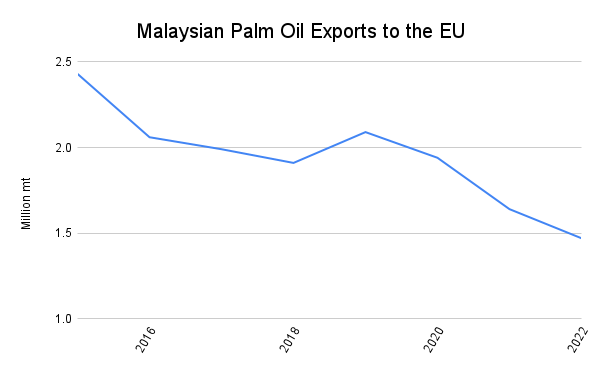Deforestation Law in the EU Set to Impact Palm Oil, Soy, Coffee, and Beef Trade


On the 19th of April, the European Parliament approved a deforestation law, known as the European Deforestation-free Regulation (EUDR), aimed at banning imports into the EU of commodities linked to the deforestation of global forests. Under the new legislation, companies supplying products to the bloc must prove that their goods were not grown on deforested lands after 2020 through due diligence statements and other verifiable information. Failure to comply could result in fines of up to 4% of the firm's revenue in an EU member state. The products that could be impacted by the law include soy, beef, and coffee, with palm oil the most affected, as the EU is the third largest palm oil importer in the world.
Malaysia and Indonesia, the leading global palm oil suppliers, fear the move could significantly hamper exports to the EU. According to Malaysia's Ministry of Plantation Industries and Commodities, 26% of the country's planted area is utilised by more than seven million smallholders who may struggle to meet the cost of compliance. In 2022, Malaysia exported 1.47 million mt of palm oil to the EU, and this figure could drop significantly this year if small farmers fail to prove their compliance with the EUDR using precise geolocation data. Furthermore, the Malaysian government is also considering ceasing palm oil exports to the EU as a reaction to the law, hoping to push the EU to revise or reconsider its ban.

Source: Tridge, MPOB
Brazil is another country that could be severely affected by the EUDR, given that the South American country is a leading exporter of a lot of the products being targeted by the law, such as soy, coffee, and beef. According to the Brazilian Coffee Exporter's Council (CECAFE), Europe is Brazil's leading market, accounting for 45% of the country's coffee exports. According to the European Commission, the EU also accounts for 29% and 22.6% of Brazil’s soybean and beef exports, respectively. As a result, leading associations in Brazil, such as Associação de Galerias de Arte do Brasil (AGAB), have opposed the law, given that Brazil already has a forest code that regulates deforestation in the country. Despite this, Brazilian firms will still have to comply with the EU's compliance laws for the EUDR.
Any misgivings in the EU market resulting from the EUDR could lead Brazil to focus more on China, following the Asian country’s recent decision to permit beef imports from Brazil, following the ban that was placed by China on Feb-23 due to cases of Mad Cow disease in Brazil. China is Brazil's leading market and the largest beef importer in the world. As a result, the suspension of Brazilian beef exports to China, which lasted from late February to late March, significantly lowered monthly exports. In March 2023, the volume and value of beef exports from Brazil dropped by 26% YoY to 124.4K mt and 40% YoY to USD 598.8 million, respectively, the lowest in almost two years. However, following the lifting of the ban, exported volume in the upcoming months could return to YoY growth as the outlook for Chinese demand looks brighter compared to previous months.
Tridge anticipates that the price of Malaysian palm oil will decrease in the coming month as the market reacts to the news of the EUDR, a law that could result in the South Asian country sending more volumes to other markets, such as India, China, and Kenya. For example, Indian palm oil imports are expected to rise by 16% YoY to 9.17 million mt in 2022/23, a four-year high, due to increased consumption, according to the Indian Vegetable Oil Producers’ Association. Palm oil futures are already leaning in this direction. On the 19th of April, following the news that the EU had agreed on the law, the FCPOc1, a Malaysian Crude Palm Oil Future contract, traded at USD 921.40 (MYR 4,097), down 1.04% compared to the previous day and 5.6% lower than USD 974.47 (MYR 4,333) on the 10th of April. Imports of soy, coffee, beef, and palm oil in the EU are also expected to decline once the law comes into effect. The law still requires formal approval from EU member countries before it can enter into force. Following that, large companies would have a year and a half to comply, and smaller firms will have two years. This remains a developing situation, with more countries expected to react to news in the coming weeks.
For related stories click on the following links:
2. Record Brazilian Beef Exports in 2022, Although Prices Close the Year in a Downward Trend



